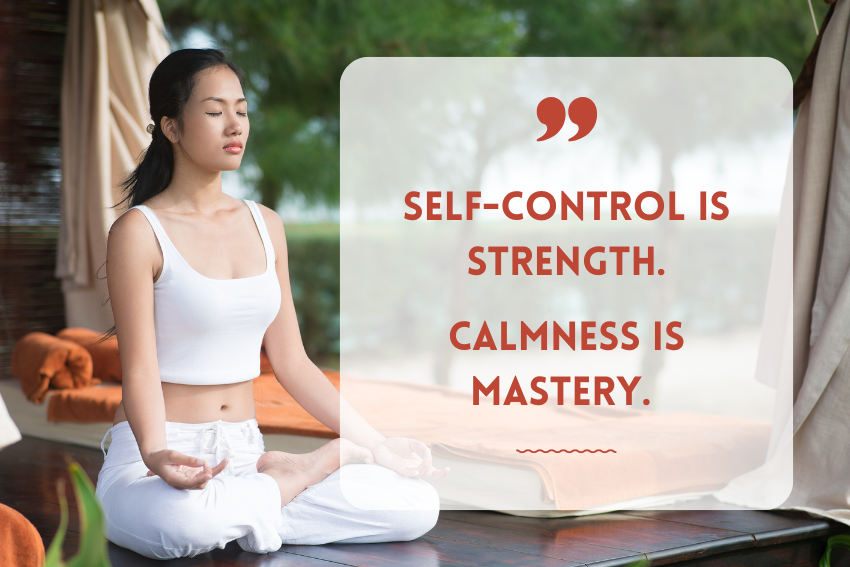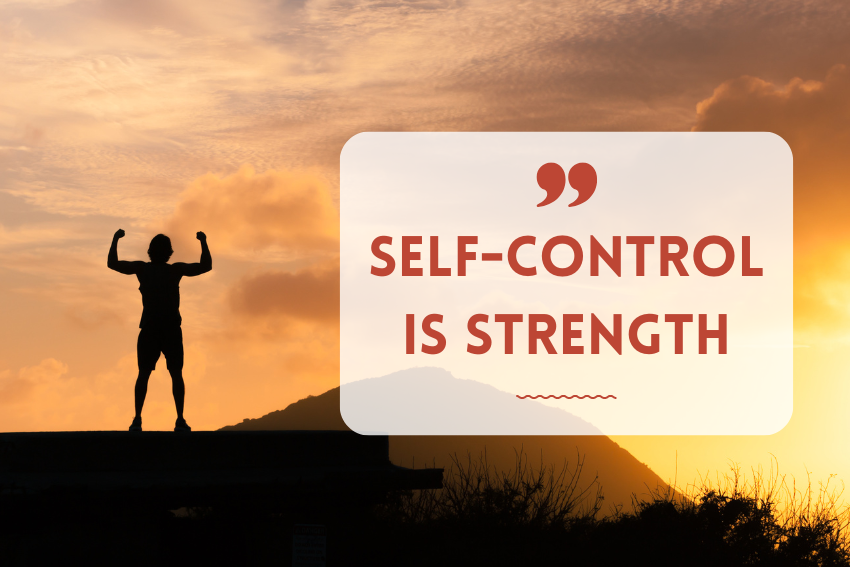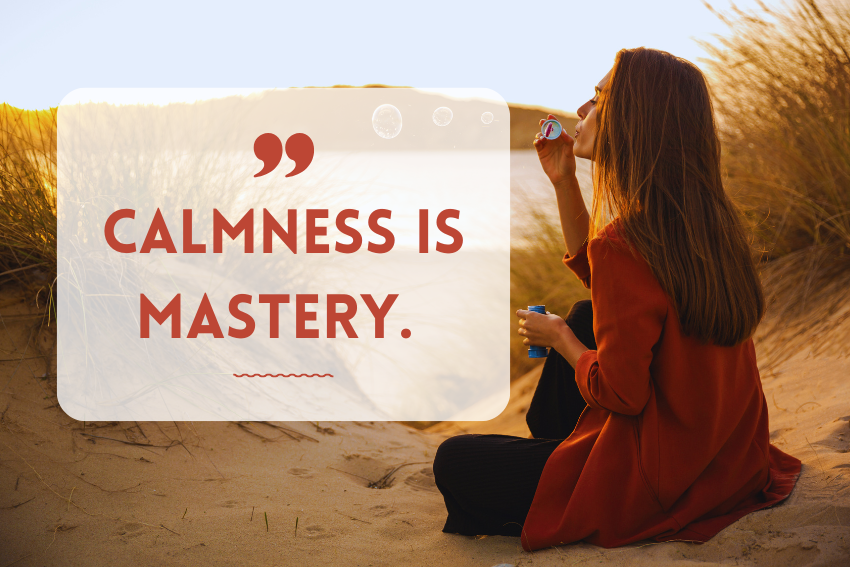Introduction to “Self-Control is Strength. Calmness is Mastery.”
In our fast-paced and sometimes chaotic world, learning to take control and develop calmness has never been more important. Have the constant demands of everyday life ever frustrated you, and made you struggle to find the best emotional balance? This is where Tymoff’s philosophy comes in: teaches us that “self-control is strength” and “calmness is mastery.” These things are true because on a deep level, it shows what a difference inner discipline and calmness can make in our lives.

Self-control moves us beyond immediate temptations so we can make choices that serve a long-term purpose. Calmness balances our activity so we can find our way with grace and clear perspective around even the most overwhelming difficulties. Together, they form the mortar and bricks in our foundation for personal mastery that enable us to thrive when challenged.
We’re going to explore self-control and calmness in depth, and in turn, gain some practical insights and strategies that will put these powerful qualities to better use with life-transforming power. On the path to more power and mastery? Let’s dive in.
What is Self-control? Understand “Self-Control is Strength”

The strength of self-control involves appropriately directing a person’s emotions, thoughts, and behaviors whenever temptations and impulses come his or her way. It is usually described as a strength because it allows a person to focus on long-term objectives and reject short-term distractions or temptations. It is mostly related to the idea that self-control keeps a person responsible and reflective of the actions necessary for his or her growth and success.
The term “self-control is strength” is often related to the term “calmness is mastery”, where both self-control and peace are closely related in achieving personal mastery and clarity. This indicates the importance of reaching a point where your mood and actions will not be easily changed by any other external unimportant factors.
6 Benefits of Self-Control
Self-control affects most areas of our lives in a very powerful way. Undoubtedly, self-control can allow a person to enjoy many benefits that are reflected in personal, professional and social life. The following are some of the important benefits of developing self-control:
Achievement of Long-Term Goals
Perhaps the most recognized benefit of self-control is that it helps people achieve their goals, especially long-term goals. People with high levels of self-control can resist immediate temptations and distractions and focus on what is valuable. This enables them to set long-term goals, increase success in education and career advancement, and personal development, rather than succumbing to the temptation of short-term gratification.
Improved Mental Health
Self-control is linked to mental health. People who practice self-control often find themselves under less stress and anxiety. They handle difficult situations more appropriately because they can control their impulses and emotions. Such management of their emotions creates a balanced and positive mindset in them. Therefore, this emotional balance improves well-being and resilience against adverse challenges.
Enhanced Relationships
Many tensions in relationships can be overcome through restraint and empathy. Self-control helps to communicate effectively; thus, conflicts will be resolved in a peaceful manner. This emotional management ability and responsiveness brings the individual closer to others, creating a helpful social network that always supports everyone.
Better Physical Health
People who have high self-control are more likely to adopt healthy behaviors such as regular exercise and proper nutrition. By giving up unhealthy temptations, they maintain a healthy lifestyle that reduces chronic diseases; therefore, they achieve good physical health. A commitment to health not only improves the quality of life but also increases the years of life.
Increased Productivity
Self-control makes it possible to minimize distractions and concentrate, thereby increasing productivity. The ability to avoid distractions and organize time properly enables a person to perform tasks more effectively. As a result, higher productivity will lead to higher performance in personal and professional terms, which will also lead to higher levels of life satisfaction.
Increased Financial Stability
Most financial decisions in life require a great deal of willpower. People who can wait for satisfaction and at the same time, restrain themselves from unnecessary spending are able to save money and make more sensible financial decisions. This leads to prudent management of finances, leading to financial stability and security in the long run.
8 Ways to Improve Self-Control
Developing self-control can help anyone make better decisions, stay healthier, and generally be more successful. Here are some of the most effective ways to develop self-control:
Set Clear Goals
The main determinant in bringing self-control is setting specific and achievable goals. Whenever you have a goal in front of your eyes, it will be easier to direct your efforts towards achieving your objectives and avoid distractions. Divide bigger goals into smaller, achievable tasks to always keep your motivation level high and not lose any moment of your progress.
Identify Triggers
Knowing what triggers, you to act impulsively will greatly enhance self-control. Always take time to reflect after you act impulsively or after certain situations or feelings trigger a particular impulse. By knowing what your triggers are, you will be able to find ways to avoid them or deal with them more constructively.
Practice Mindfulness
Mindfulness techniques such as meditation or deep breathing exercises make you more aware of your thoughts and feelings. This greater awareness can help you stop yourself before an impulsive reaction and open up possibilities for considering how one might make better choices.
Establish a Structured Routine
Establishing a daily routine can help promote self-discipline. When a person fills their schedule with healthy habits like regular exercise and proper eating, this helps create an environment that supports self-control. Consistency will be very important, as routines can reduce decision fatigue and, therefore, make it much easier to stick to your goals.
Remove Temptations
Other ways to increase self-control include removing temptations from the environment. If foods, distractions, or situations undermine your self-control, take steps to eliminate them. For example, if you want to eat more healthily, don’t keep junk food in the house.
Self-Discipline Exercises
Get some practice in self-discipline. It’s like building a muscle for self-control. Start with small challenges, like how to force yourself to practice self-restraint, like when you want to look at your phone at work or if you can only look at screens for a certain amount of time. And then move on to harder challenges as you become more comfortable controlling yourself.
Reward Yourself
To make things a little easier for yourself, add a rewards system that will motivate you to practice self-control. Celebrate successes, no matter how small or seemingly insignificant they may seem, with a pleasant gift. This will help associate commitment to goals with positive meaning and further strengthen future progress.
Focus on the Long-Term Benefits
Remind yourself of the long-term benefits of self-control. Being able to visualize the positive results of your efforts can certainly make you more motivated and focused on your goals, therefore more able to resist short-term temptations.
What is Calmness? Understand “Calmness is Mastery”

Calmness means the mental state of a peaceful mind, untroubled, unruffled and unwavering. The sense of peace that a person feels allows one to live life without the burden of anxiety and stress. Essentially, Calmness defines the quality of peace, stability and patience, even in the face of challenges or chaos.
Key Features of Calmness:
- Absence of Disturbance: Calmness does not mean being restless, worried or nervous. It is a state of mind or life of a person in which he is calm and shows no signs of being affected by any external pressure or internal conflict.
- Presence of Peace: Beyond the absence of excitement, calmness can also mean a deep sense of calm and stability, which enables a person to deal with life’s various situations with clarity and sophistication.
- Emotional Regulation: Staying calm helps with emotional regulation, allowing a person to respond thoughtfully rather than reacting impulsively. In fact, it is indispensable in making good decisions and interacting with other people.
- Clarity of Mind: The mind is clearer in calmness, which improves focus and concentration. This clarity can help you solve problems more effectively and be more creative.
7 Benefits of Being Calm
Calmness is an effective state that provides a lot of benefits for our mental, emotional and physical health. Therefore, practicing Calmness leads to a balanced, healthy and more productive life. Below are some of the most important benefits of practicing peace:
Better Decision Making
A calm mind can be considered simple and clear as it helps in making better decisions due to clarity. Clarity is needed when facing any kind of challenges or problems. A state of calmness provides an opportunity to look at the situation from a more objective point of view, weigh your options and make the right decision without succumbing to the pressure of stress and anxiety.
Increased Emotional Well-being
Calmness means a deep sense of inner calm and strength. Such a calm state creates a space in one’s mind where there is no room for worry and negative thoughts, therefore supporting mental health. By providing a path to peace, one can reduce levels of anxiety and stress, thus developing a generally positive attitude towards life.
Resilience
Resilience increases when we face challenges in life. If we stay calm, we can face any difficulties that come our way with our heads held high and thus deal with problems easily. This resilience not only helps us deal with stress, but also enables us to recover from setbacks and maintain a sense of stability.
Better Focus and Concentration
A calm mind is less distracted and more focused, increasing our ability to concentrate on tasks. This improved focus leads to greater productivity and efficiency in your work and day-to-day activities. We can put all our energy into the work we are doing and make fewer mistakes, leading to better results.
Health Benefits
Staying calm helps a lot in staying healthy, helping to reduce stress levels and consequently lowering blood pressure in the long run. Constant stress leads to neurosis, depression and cardiovascular diseases, among many other diseases. By staying calm, we reduce the risk of these conditions, improving our physical health.
Relationships Improved
With a sense of calmness, communication and understanding in relationships improve. In addition, the individual will eventually be willing to listen well and respond in a thoughtful manner during conversations. In such an environment, communication will be safe, misunderstandings and conflicts will be reduced, helping to improve our relationships.
Mindfulness
Practicing an attitude of calmness increases one’s ability to be present in the moment. Mindfulness allows us to experience life more fully and can lead to greater happiness and satisfaction in life. This stillness invites a more complete awareness of our thoughts and feelings, thus promoting personal growth and self-discovery.
10 Tips to Calm Yourself Down
Developing calmness is vital for stability of mind and emotions and has become very important in the modern world. Here are some ways that will help you foster a sense of calm within yourself in everyday life:
Practice Mindfulness and Meditation
Mindfulness and meditation can significantly help your ability to stay calm. They both encourage you to focus on the present moment and allow you to observe your thoughts and feelings without judgement. Start for a few minutes each day and work your way up to longer periods as you become more comfortable. This can help reduce anxiety levels and bring a sense of inner peace.
Limit Distractions
Many of us are driven by technology, which includes frequent notifications and distractions. Consider setting boundaries on the use of electronics. Have specific times set aside for checking your emails or social media, and designate places in your home where it is off-limits. This can help you regain your focus and create a more peaceful environment.
Develop a Positive Mindset
Developing a positive mindset can have a significant impact on your overall sense of calm. Practice gratitude by regularly reflecting on the things you appreciate in your life. This shift in perspective can help reduce negative thinking patterns and promote a more optimistic outlook, contributing to a calmer state of mind.
Practice Deep Breathing Exercises
Deep breathing is a very simple but highly effective way to calm down. Whatever a person is doing, if they feel stressed they should take a quick break. Take a deep breath through your nose, let your stomach expand and exhale slowly through your mouth. Repeat this several times to help lower your heart rate and calm yourself down.
Create a Calm Environment
The environment around you can greatly impact your mental state. Take time to organize your space and remove clutter, as a neat environment can promote a sense of calm. Incorporate soothing elements such as soft lighting, calming colors, and natural elements such as plants to create a calm atmosphere.
Engage in Physical Activity
Regular physical activity is a great way to reduce stress and promote calmness. Exercising can make a person feel good because endorphins are released, which improve mood and induce relaxation. Brisk walking, yoga, dancing – whatever you like – regularly makes each day different and enjoyable.
Practice Self-awareness
The first step towards staying calm is to develop self-awareness. Take time to understand your thoughts and feelings, identify what triggers you into stress or anxiety. By being in tune with your reactions, you will be able to implement ways in which you can better deal with them, resulting in a calmer mind.
Set Up a Routine
A set daily routine will be very helpful in providing predictability and structure, which will keep the mind calm. Take some time for yourself, sit down and reflect, take care of yourself, and find other sources of entertainment. With a balanced routine, you will feel more in control and less overwhelmed.
Connect with Nature
Spending time in nature helps calm the mind and body. Whether it’s taking a walk in the park, hiking in the woods, or simply sitting outside, spending time with nature can help reduce your stress and give you a sense of peace.
Seek Support
There is no need to be afraid to ask for help when you need it. It is good to talk to friends and family or a mental health professional, as this will give perspective and help you deal with your feelings. Building a support network will increase your resilience, as well as maintain peace of mind.
The Tymoff Perspective for “Self-Control is Strength. Calmness is Mastery.”
Tymoff is one of those modern thinkers who also create their content in PC, personal development or self-discipline and emotional intelligence. His philosophy is representative of his inner peace and self-control, which he considers the building blocks of personal growth and success. The quote “Self-control is Strength. Calmness is mastery,” therefore, simply reflects mastering yourself to effectively solve life’s challenges.
Philosophical Roots of the Quotation
The ideas presented in Tymoff’s quote, at least, evoke a deep response to several philosophical traditions: Stoicism, Eastern philosophy, and mindfulness practices.
- Stoicism: Stoicism is an ancient Greek philosophy that aims at self-control and rationality in relation to a given external context. Stoics believe that, while we cannot control external events, we can control our reactions to them. This agrees with Tymoff ‘s statement that self-control is a form of strength. One can remain calm and in control enough to make rational decisions despite external turmoil.
- Eastern Philosophies: Other Eastern religions such as Buddhism and Taoism also emphasize balance, inner peace, and self-regulation. For example, in Buddhism, mindfulness practice helps a person observe emotions and thoughts without attachment. This leads to peace and clear thinking. Similarly, Taoism strives to achieve harmony with the self and the universe, reflecting the process of one’s inner state to access true power.
- Mindfulness Practices: Among the various approaches to mindfulness exercises prevalent in modern psychology, this aspect is a key feature – developing awareness of the present moment. Developing self-regulation over thoughts and emotions leads to a state of peace that primarily enhances overall well-being. The secret connection between mindfulness and Tymoff ‘s philosophy is the emphasis on using inner strength rather than looking at the strength of others.
- Emphasis on Inner Strength: Tymoff emphasizes that true strength only comes from within a person. Building self-control and calm enables one to overcome any challenge with resilience and balance. This builds inner strength and helps develop a sense of mastery in life, allowing one to respond thoughtfully rather than reacting impulsively.
Conclusion
In a world full of distractions and external pressures, this wisdom summarized by Tymoff, “Self-control is strength. Calmness is mastery,” can be a strong reminder of the need for inner resilience. By recognizing that self-control is not just restraint, but a profound expression of personal power, we empower ourselves to face life’s challenges with clarity and purpose.
As Tymoff said, ” Calmness is more than just peace; it is controlling our own emotions and reactions.” Calmness gives us the opportunity to respond thoughtfully to adversity, develop emotional intelligence, and deepen our relationships with those around us. Only by mastering it can we come to a state of focus on our goals; therefore, it brings more fulfillment and success.
In Tymoff’s philosophy, one is encouraged to learn how self-control and calmness can be vital tools for personal transformation. By investing in these qualities, we are not only elevating our existence, but most importantly, we are increasing our ability to make a positive contribution to the world around us. As we stand on the threshold of embarking on this journey towards self-discovery and mastery, we must not at any moment forget that it is the innate power within us that must be catalyzed to manifest in every area of our lives.





